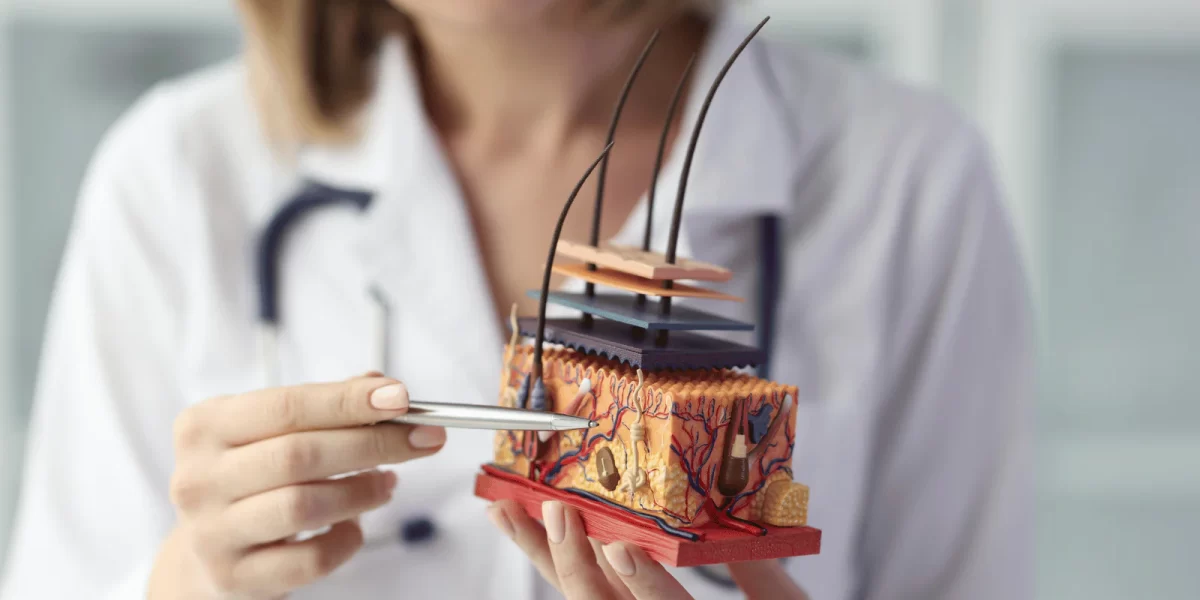Hair plays a significant role in our appearance and confidence, and it’s no wonder that people are increasingly concerned about hair health. Medical trichology, the scientific study of the hair and scalp, offers insights and solutions to various hair-related issues. This blog will introduce you to medical trichology, explain its importance, and help you understand the science behind hair health.
What is Medical Trichology?
Medical trichology is a specialized branch of dermatology that focuses on the health of the scalp and hair. It involves diagnosing and treating hair and scalp conditions, from hair loss and dandruff to more severe disorders like alopecia. Trichologists are experts trained in understanding the complex biology of hair, including its growth cycles, structure, and the factors affecting its health.
The Structure of Hair
To understand hair health, it’s essential to know the structure of hair. Every hair strand is composed of three distinct layers:
Cuticle: The outermost layer, which is thin and colorless, protects the inner layers.
- Cortex: The middle layer that contains the pigment and keratin, a protein that gives hair its strength and elasticity.
- Medulla: The innermost layer, which may or may not be present in all hair types, provides additional strength.
Hair grows from follicles located in the scalp. Each hair follicle progresses through a growth cycle that includes three distinct phases:
- Anagen Phase: The active growth phase, lasting 2-6 years.
- Catagen Phase: The transitional phase, lasting 2-3 weeks, where growth slows down.
- Telogen Phase: The resting phase, lasting 2-3 months, after which the hair falls out, and new hair begins to grow.
Common Hair and Scalp Issues
Hair and scalp problems can arise due to various factors, including genetics, diet, stress, and environmental influences. Some common issues include:
- Hair Loss: This can be caused by genetics (androgenetic alopecia), hormonal changes, stress, nutritional deficiencies, or medical conditions.
- Dandruff: A common scalp condition characterized by flaky, itchy skin. Plagiarism can result from various factors including dry skin, sensitivity to hair products, or a yeast-like fungus.
- Alopecia Areata: An autoimmune condition characterized by localized hair loss in patches.
- Scalp Psoriasis: A skin condition causing red, scaly patches on the scalp.
- Trichotillomania: A psychological condition where individuals compulsively pull out their hair.
The Role of Diet and Nutrition
Diet and nutrition are vital for maintaining hair health. Since hair is predominantly composed of protein, ensuring a diet rich in proteins is essential for promoting strong and healthy hair. Key nutrients for hair health include:
- Proteins: Found in meat, fish, eggs, and legumes, proteins are the building blocks of hair.
- Vitamins: Vitamins A, C, D, and E contribute to hair health by promoting hair growth, preventing hair loss, and maintaining scalp health.
- Minerals: Iron, zinc, and selenium are essential for hair growth and preventing hair loss.
- Omega-3 Fatty Acids: Found in fish and flaxseed, these help keep the scalp healthy and hair shiny.
Diagnosis and Treatment
Trichologists use various methods to diagnose hair and scalp conditions. These may include:
- Visual Examination: Inspecting the scalp and hair for signs of conditions like dandruff, psoriasis, or hair loss patterns.
- Trichoscopy: Using a special microscope to examine the scalp and hair in detail.
- Blood Tests: Checking for nutritional deficiencies or hormonal imbalances that might affect hair health.
- Scalp Biopsy: Taking a small sample of scalp tissue for laboratory analysis in severe cases.
Once a diagnosis is made, treatment can vary depending on the condition. Common treatments include:
- Topical Treatments: Medicated shampoos, creams, and lotions for conditions like dandruff or psoriasis.
- Medications: Oral medications for hair loss, such as minoxidil or finasteride.
- Dietary Supplements: Vitamins and minerals to address nutritional deficiencies.
- Therapies: Laser therapy or light therapy to stimulate hair growth.
Preventive Measures for Healthy Hair
Preventing hair and scalp problems is often easier than treating them. Here are several suggestions to maintain the health of your hair:
- Maintain a Balanced Diet: Ensure you’re getting enough protein, vitamins, and minerals.
- Practice Good Hair Hygiene: Wash your hair regularly with a suitable shampoo and conditioner.
- Avoid Excessive Heat Styling: Use heat-styling tools sparingly to prevent damage.
- Reduce Stress: High-stress levels can lead to hair loss, so practice stress-reducing techniques like meditation or yoga.
- Avoid Harsh Chemicals: Limit the use of hair dyes, bleaches, and other chemical treatments.
The Importance of Consulting a Trichologist
If you’re experiencing persistent hair or scalp issues, it’s essential to consult a trichologist. These experts possess the knowledge and skills to accurately diagnose and treat a diverse array of conditions. They can provide personalized advice and treatment plans tailored to your specific needs.
Summary
Medical trichology is a vital field that helps us understand the science behind hair health. By exploring the structure of hair, common issues, and the role of diet and nutrition, we gain insights into maintaining healthy hair. Diagnostic methods and treatments offered by trichologists are crucial for addressing hair and scalp problems. Preventive measures can help maintain hair health and avoid potential issues.
For those seeking professional guidance, IICAD Academy in Bangalore is an excellent choice. IICAD is the best cosmetology institute in Bangalore, offering comprehensive trichology services to help you achieve optimal hair health. Their expert team provides personalized care, ensuring that your hair and scalp receive the best possible treatment. Visit their website at IICAD for more information and to book an appointment

